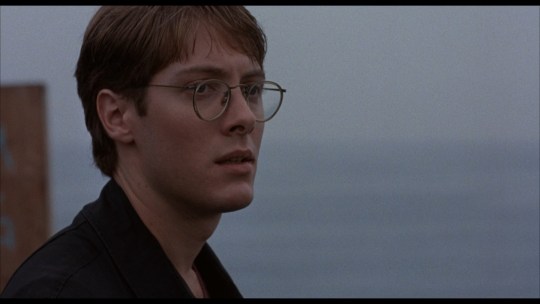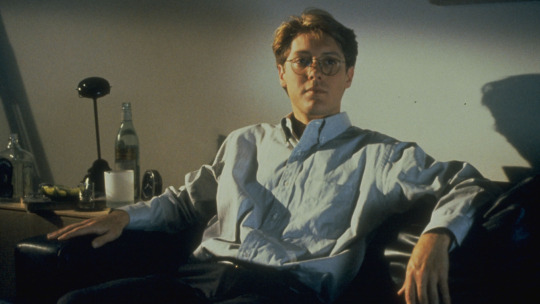#bad influence 1990
Text

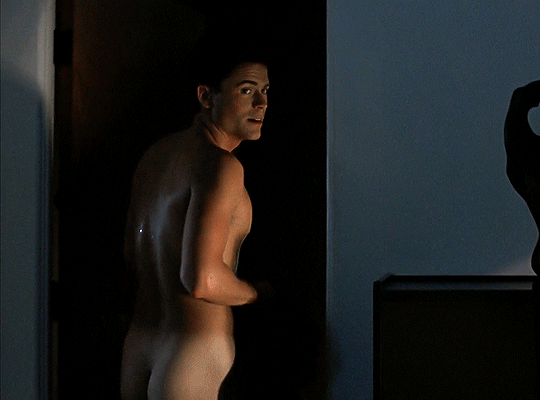
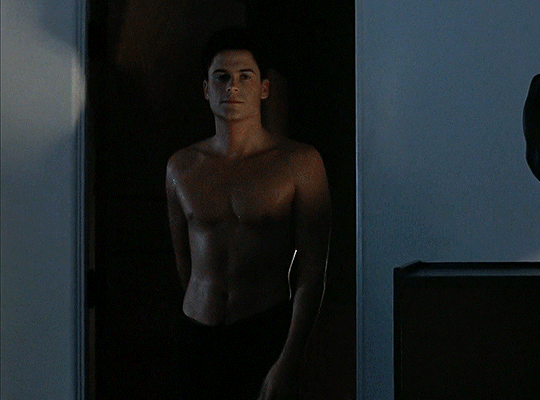
ROB LOWE
Bad Influence (1990)
#rob lowe#robloweedit#bad influence#bad influence 1990#movie#film#filmedit#90s#90sedit#actor#men#menedit#gifs#mine#*
555 notes
·
View notes
Text
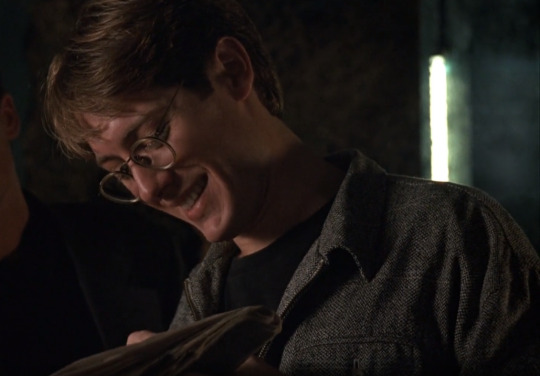
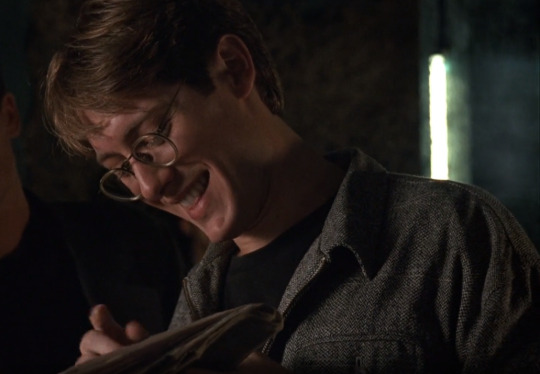
James Spader in Bad Influence (1990) dir. Curtis Hanson
#bad influence 1990#bad influence#james spader#i die#i still want those exact glasses but i don't have 600 dollars for them#curse you oliver peoples
85 notes
·
View notes
Text
So my sister and I undertook to have a three-month long James Spader movie marathon, where we watched 1-2 spader films each week. It's like imagine white boy summer but there's just the one white boy and it's James Spader.
Some of these were first- watches for me, so I decided to do reviews for all of them and rate them on a scale of 1-5 spades-- that's judging them as James Spader movies, not necessarily as films in and of themselves--and answer, for each film, the most important question: "Is James Spader Naked in the film?"
Of course we didn't hit all the possible films in his IMDB list, but there's always next year.
Something else to take note of, I don't know why anyone interested in a James Spader post wouldn't know this but he's really got a limited number of genres: low budget sci-fi, weird teen movies, and erotica. the erotica part is gonna be discussed a lot here.
The Shadow of Fear (2004)
♤♤♤
Is James Spader Naked?: No
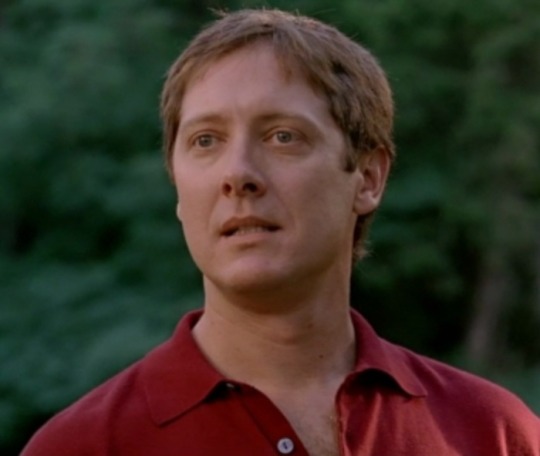
James Spader steps into his customary antagonist role as a blackmail mastermind in this 2004 TV movie starring Matthew Davis and Robin Tunney.
I don't really have much more to say about it, but it's not a terrible way to kill two hours and get a little Spader fix.
Alien Hunter (2003)
♤♤♤
Is James Spader Naked?: Unfortunately, it's set in the antarctic, so no, James Spader is never naked, but oh well.

What an interesting watch this was! James Spader plays a womanizing linguistic's expert specializing in the auditory side of language, who is engaged by an Antarctic expedition to examine a possibly alien object uncovered in the frozen waste.
This an American-Bulgarian production and as low-budget sci-fi goes, it's really quite... well I won't say good, but it's got integrity and I like that. It doesn't go where you think it's going to, and when it was over I wanted to know more and I think that speaks in it's favour.
Secretary (2002)
♤♤♤♤♤
Is James Spader Naked?: It takes until the end of the movie but yes, of course he is.
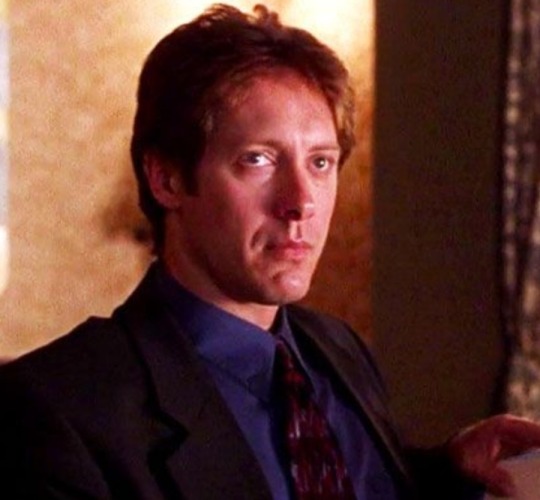
What do I even need to say about this film? This movie is legendary.
Lee, a troubled young woman with an ongoing struggle with self-harm gets out of rehab and endeavors to become a productive member of society by applying for a job as a secretary. Her new employer, E. Edward Grey, attorney at law, is enigmatic, obsessive compulsive and very particular. However, when he discovers Lee's compulsion to self-harm he offers her alternative, safer methods of coping with her unhappy home-life through BDSM.
Though many BDSM practitioners are, understandably, a bit tired of the trope this film perpetuates of BDSM exclusively as therapy for broken people; and the unsolicited instigation of the relationship in the film definitely warrants a "Don't try this at home" warning, it is, in all other respects, generally regarded as the most authentic portrayal of the essence of BDSM in regards to the characters' emotions and relationship to each other. It portrays BDSM as mutual devotion, as it should, and the last five minutes really pack a punch by including a very important aspect of the lifestyle that often goes underrepresented in films with a BDSM focus: aftercare.
According to Maggie Gyllenhaal, during the filming of Secretary she and Spader developed a bdsm-esque ritual in which he would send a PA to fetch her from her dressing room, and bring her to the door of his (which was literally two feet away). She would then knock on his door, he would invite her inside and offer her a chocolate.
And I think that's all I need to say because this rapport comes through on screen, and I'm not certain this movie isn't the closest James Spader has ever come to playing...himself.
Supernova (2000)
♤♤♤♤
Is James Spader Naked?: Yes. Quite.

I'm only being honest when I say that this is a mediocre sci-fi film, but it has a shockingly fun cast and it labored in production hell until it was so altered by the production studio, the director completely orphaned the project and refused to have his name attached to it.
But what we do get is a true James Spader film through and through. He's brunette here, which is ODD, but he's also possibly the most jacked he's ever been (which isn't a lot, but it is noticeable in a very nice way) and what's better is there's a primal sexual undercurrent that saturates the film in a surprisingly satisfying way and culminates in James Spader and Angela Basset climbing naked into a pod and swapping genes very literally.
Crash (1996)
♤♤♤
Is James Spader Naked? Oh, yes.

I couldn't watch this one with anyone--I had to see it alone, and I'm glad I did.
This is perhaps the most infamous entry in James Spader's filmography, but it's fairly on brand for him. There's a lot of sex scenes, in three of which he's nude.
Spader plays James Ballard, a film producer in an open and frankly unmotivated marriage. Both James and his wife Catherine find the need to pursue risky sexual liasons just to have sex with each other. After experiencing a traumatic car crash James launches himself and his wife headfirst into a world they were already dipping their toes into, and they get involved with a cult that fetishizes the violence of car crashes.
That this is a classic James Spader film is not a matter of dispute. It is, however, different from the two other of his most famous movies that deal with sex as a focal point of the story--Sex, Lies, and Videotape and Secretary. In both of these films, sex is catharsis and it is through the characters' exploration of their own sexuality and sense of intimacy that they come out on the other side of the tunnels they find themselves in.
Not so in Crash. Here, sex is a byproduct of an obsession with far more dangerous and destructive impulses. These characters don't come out on the other side of a tunnel, they fall straight down a mine shaft and never come back.
As a Cronenberg film this is great (granted this is the first Cronenberg film I've ever watched, but). It's well executed and it knows what it is and what it wants to convey.
For my own satisfaction as a James Spader movie, though, I find it to be middling. The nudity is great, but, since James Spader plays, essentially, the narrator, he's kind of playing second fiddle for much of the film. He's not much of a focal point in my opinion and it loses me a bit in the middle for that very reason. Now, the fact that Sex, Lies and Videotape and Secretary are two of my top three James Spader films may be telling when I say that Crash really just isn't my speed. I absolutely recommend watching it at least once if you think you can hang with it, because it is worth it: it's simply not a story I feel the need to revisit.
Wolf (1994)
♤♤♤
Is James Spader Naked?: No, but there is a very short silk robe.
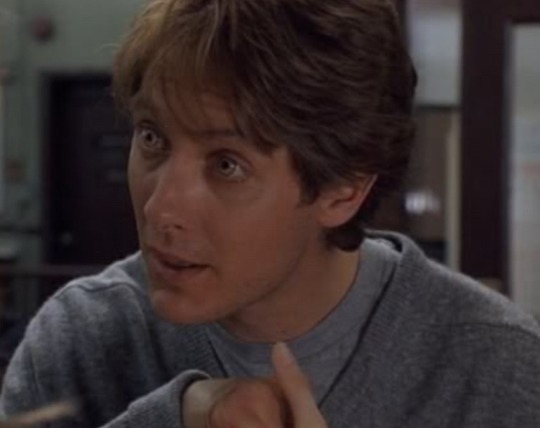
I suppose in the strictest technical terms this is actually a Jack Nicholson movie. Which is a shame because if the main character was played by LITERALLY anyone but Jack Nicholson it would probably be one of my favorite movies of all time.
Alas, we're not here to review Wolf as a Film, but as a James Spader movie. In that context it lands in the middle. His role as the antagonist is really just a side-character. He doesn't really become important until the last half hour of the film, but boy do they pull out the stops.
Once again, he's never nude in the film which is a detractor. He does, however, turn into an aggressively, grossly sexual wolfman and it is deeply uncomfortable but also great to watch. And the yellow contacts are just amazing.
Stargate (1994)
♤♤♤♤
Is James Spader Naked: Solid no, but the lesbian energy more than makes up for it.
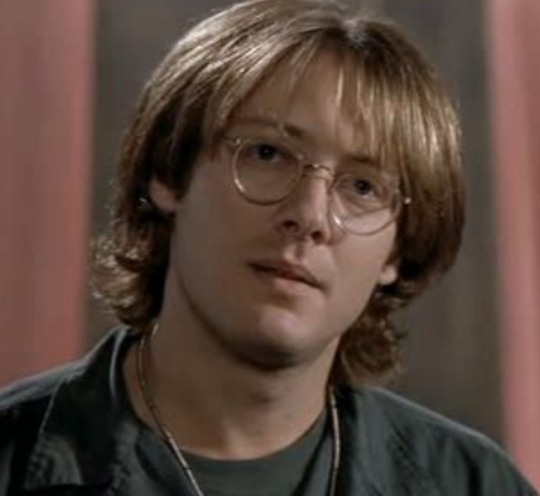
James Spader stars as Dr. Daniel Jackson, a young Egyptologist and linguist whose eccentric theories strain the credulity of the conventional archeological community. They do, however, get him recruited by a military project which focuses on a singular technological find discovered on an archeological dig: the Stargate. Daniel helps to unlock the secrets of the portal which transports him and a group of soldiers to a desert planet with a human population who are enslaved by an alien race who inspired the Egyptian gods. He also picks up a wife along the way.
A classic. I feel like James Spader said "you know what I'm going to take a break from the weird sex stuff... just briefly". Never has he played a more wholesome character, never has his hair been so floppy.
Dream Lover (1993)
♤♤♤♤
Is James Spader Naked?: Very much so. He's VERY naked in this film which is what earns it the fourth spade. Very. Naked. It might be the most naked he's ever been.
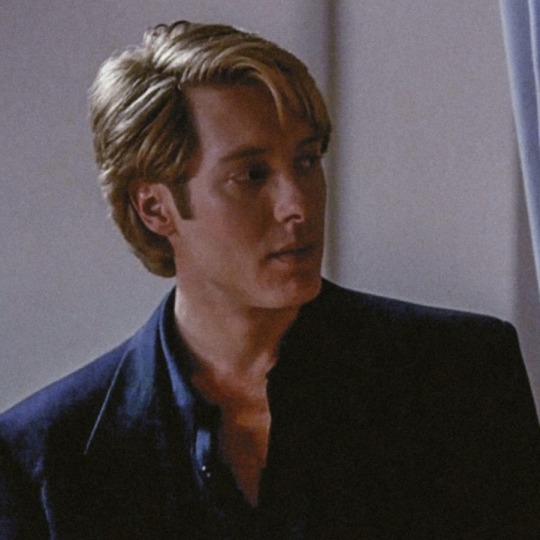
As an erotic thriller, this is a slight disappointment. Really. Never have there been two sexier people in an erotic psychological drama that had zero chemistry with each other than James Spader and Madchen Amick. But oh, my, he's so pretty in this one, and that really does make it worth watching.
As an aside, I have this bee in my bonnet about how if the Twilight Saga films had been made in the 80's, James Spader would have played Jasper. Now this is of course in the 90's, but James Spader's particular shade of Honey blonde hair in this movie only reinforces my feelings on this. His acting in the last five minutes plays out, to me, like an AU where Jasper killed Maria before he left.
True Colors (1991)
♤♤♤♤♤
Is James Spader Naked?: Not quite, but almost!

This is a political drama and a fairly sedate turn in Spader's repertoire. And if it wasn't for Spader I don't know that I could recommend it unless you really wanna spend an hour-forty-two staring at John Cusack's wide-set, beady eyes and disconcertingly small mouth.
But as an entry in James Spader's filmography it is extremely valuable to me. He's not naked (close--there's a bathrobe) but as usual there's something in his character and performance to make up for the lack. In this case, it's his long, hard, incredulous staring and expressions of absolute disgust as his best friend continuously tries to defend his own cataclysmicly stupid (and criminal) decision making. Because it turns out that the only thing sexier than James Spader being a total weirdo creep is James Spader being a righteous man, full of righteous fury. By hell, it's attractive on him. Which makes it even more mystifyingly incomprehensible that Imogen Stubbs' character (what is she even doing here?) has the harebrained audacity to dump him for John Cusack in this film. Hello? You have JAMES SPADER IN YOUR BED, GIRL. HE'S A GOOD, HONEST, UNBEARABLY ATTRACTIVE MAN WITH INTEGRITY AND HE DRINKS. SCOTCH. NEAT! Get your head out of your ass.
As another aside, I mentioned in the previous review that James Spader is Jasper Hale in my head, but while that's true, I think this movie, with Tim Garrity's strong sense of justice and ethics, makes a forceful argument for James Spader as Carlisle. I would have taken either and been happy though.
White Palace (1990)
♤♤
Is James Spader Naked?: before the opening credits are even finished. And then again (fully nude) half an hour in. There's also one scene that shows his thighs to great advantage.
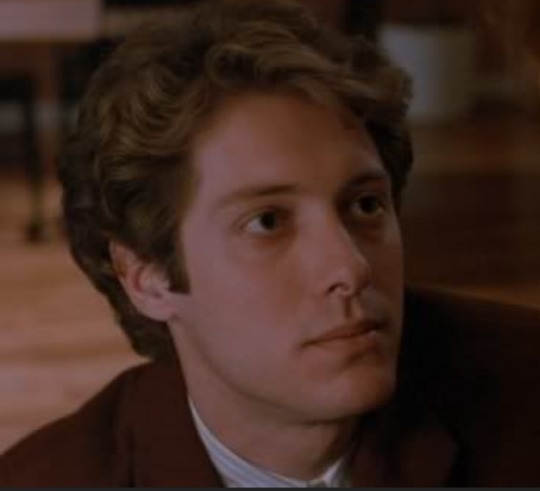
If I could do half Spades I would likely have given this one in addition to the two full Spades it already has.
On the face of it, this has all the trademarks you want from a James Spader film. You've got Spader as a dissolutioned 27 year old widower with intimacy issues (and issues in general) following the death of his beautiful and perfect young wife. The actual sex really gets used up within the first half-hour-- isn't that always the way?
But when I look closer (and this was a first watch for me which is perhaps why I'm digging so deep into it) there are some deviations to the Spader formula and I'm not quite sure they work. He plays a yuppie, and that's par for the course--but he's a Jewish yuppie which, if I'm honest is a little difficult to believe with how invariably WASPish Spader is. In addition to this frankly odd casting, we find Spader having quite a lot of sex. That's not any more out of the norm than him playing yuppies: James Spader is perhaps best known for his easy, unflinching sexuality... which doesn't quite gel when his character is supposed to be repressed and uncomfortable, awakened (and I mean that in a disturbingly literal sense) only by the skillful talents of an older, earthier woman. This is not, in my opinion, where Spader's particular flavor of sex appeal shines. If I'm watching a seduction involving James Spader, I want him to be the one doing the seducing (or at least thinking he is).
Nevertheless James Spader is James Spader, so even if the material isn't helping him, he'll find a way to make the sexy work.
What really fails to sell me on this movie might be that I'm not terribly stoked on Susan Sarandon at the best of times, but this character and story really aren't helping her out either.
Her character, Nora, is a 43 year old waitress at the eponymous White Castle Palace burger joint, and she, like Max is grieving. Except rather than dealing with the loss of a beloved spouse (her husband was a walk-out) she's grieving the loss of her teenage son who boozed and drugged himself into the river at the tender age of fourteen. Their mutual grief is the foundation for their unlikely attraction.
So after max spends a drunk night on her sofa-bed, Nora pounces by administering a blow job... while he's still asleep. After her downright predatory gazing in the bar the previous night, I can't honestly claim surprise (nowadays this would be pretty soundly recognized as rape--but the cusp of the 80's and 90's in film are a different set of standards altogether). Needless to say, In this year of our Lord, 2022 it's an off-putting way to get the ball rolling, even if he goes on to consent to intercourse with her.
Lest anyone be under the impression that I object to age gaps of 16 years in relationships (be they real or fictional) let me preface my next statement by refuting that idea. I generally don't have a problem with age gaps, even quite wide ones. However, perhaps it's that I find Sarandon generally off-putting, or perhaps it's that Nora bonded with fresh-faced Max over the death of her teenage son, but the particular brand of sexual chemistry in this movie leaves a vaguely "mommy" kind of aftertaste for me, and not in a way I find appealing.
Beyond any of that though, the sex itself in this movie didn't really spark anything in me. I believe it shoots for "erotic", but for me it lands a bit far off the mark and hits "tawdry". Not even Dream Lover screwed up that badly.
The story is ostensibly about love-conquering class differences, involving one supremely acted scene in a bathroom at--the swanky Thanksgiving dinner that Max drags Nora to in an effort to show her that he's not ashamed to be seen with her-- in which Nora gets straight up burnt for making assumptions about other people's blowjob skills. Another great aspect of the film is the presence of Eileen Brennan as Nora's fortune-telling older sister.
While the movie ends on the cute note of Max following Nora to NYC, confessing unashamed love for her and laying her down on a table in the crowded restaurant she's waitressing at, it really failed to convince me on the idea of a deeper passion between the leads, and if James Spader can't sell that, then there's a problem.
Bad Influence (1990)
♤♤♤♤♤
Is James Spader Naked?: Read on, but yes.
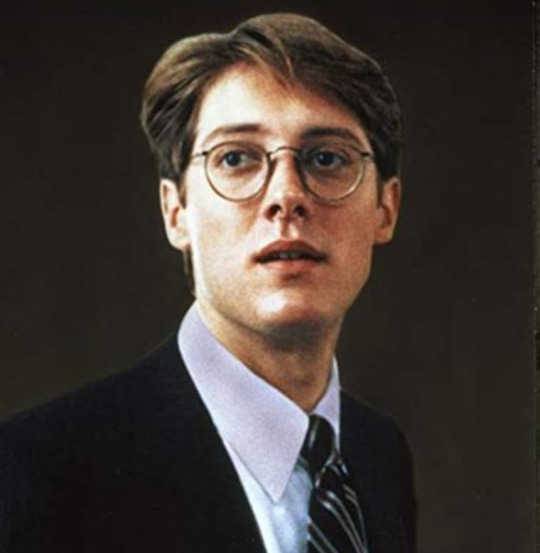
James Spader once again finds himself in his yuppie shoes in this 1990 Psychological thriller, this time as Michael Boll, a young executive who has more in life than he knows what to do with.
Playing opposite Spader (and frankly almost stealing the show) is Rob Lowe in perhaps his greatest performance ever as the psychotic grifter who sets out shake up Michael's life before ruining it-- only to find that the monster he created more than he bargained for.
What a watch! This was a first for me, and it is a trademark James Spader Film for the books. I mean look there's a fully nude sextape, a criminal night out on the town, background performance art, mayhem, murder and a confrontation with a knife: it's a big deal. Honestly, as this summer long movie marathon was supposed to go in reverse-chronological order, we technically should have watched this before White Palace, but I'm so glad we didn't.
The Rachel Papers (1989)
♤♤
Is James Spader Naked?: He is not, but boy howdy Dexter Fletcher is.
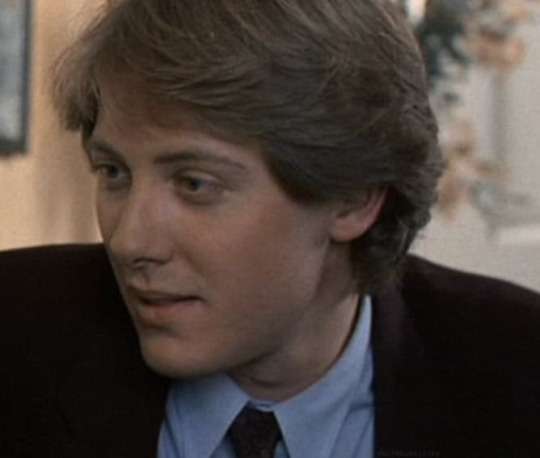
Okay, so this frankly isn't a James Spader film. He didn't really have the billing or the screen time for it to qualify, but it's a great time and he is great in it. He doesn't have much to do, but he makes do with what he's given, and in addition to that you have a young and very cute Dexter Fletcher and amazing side performances from Jonathan Pryce and Jared Harris.
Sex, Lies, and Videotape (1989)
♤♤♤♤♤
Is James Spader Naked?: I mean, given the title and subject of the film, it would be terribly disappointing if he wasn't.

Steven Soderbergh's seminal work finds James Spader truly in his element. Perhaps more so than he ever was before or ever would be again (until Secretary at least).
Not only revolutionary, but unique in the world of Indie film, Sex, Lies, and Videotape deals with people with problems.
Normally I can't be arsed about independent films, but this one truly is different. The comfortable, warm visual tone is offset by an ambient score that would normally seem more at home in, say, Chernobyl, but it all somehow fits together in a cozy, intimate way, despite the awkwardness of the characters and their varying degrees of fucked-up. And one of the truly inspired contributions to that balance is James Spader.
It's impossible to talk about Spader in this film, without discussing the film as a whole-- his comfort in the role is integral to the movie's chemistry.
By all rights, his enigmatic character, Graham, should be creepy (given that he films women discussing their sex lives and sexual fantasies as a workaround to relieve his psychologically-rooted impotency), and yet, he's not--despite his awkwardness, he's incredibly approachable, forthright, and beautifully non-threatening.
It is this approachability, and how Spader conveys it, that is the key to Graham's character as he, his honesty, and his perverse coping mechanism force the principle characters (including himself) to confront the lies they've been telling each other and themselves.
Jack's Back (1988)
♤♤♤♤♤
Is James Spader Naked?: He's shirtless. Frequently.
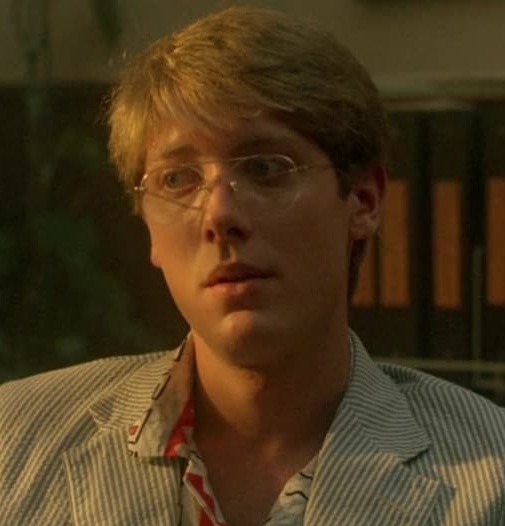
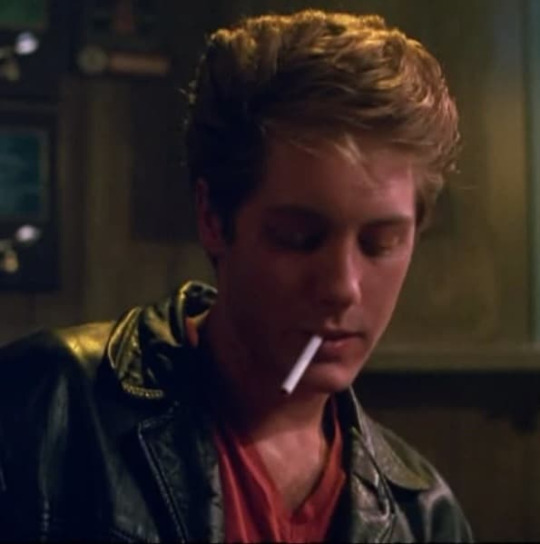
Amidst a rash of Jack the Ripper copycat murders, John Wesford (James Spader), a fiercely principled medical student, stumbles upon one of the crime scenes and is subsequently murdered. Across the neighborhood, John's twin brother, Ricky, awakes from a vivid nightmare of the murder only to see the commotion around the crime scene, visible from his balcony. Ricky must now exonerate himself and his brother's memory from the Ripper Murders.
This movie is frankly better than it has any right to be. It's a far cry from the nuances of Sex, Lies, and Videotape, but pound for pound if you want a hefty dose of James Spader just looking his absolute prettiest, this is the movie for you. And what makes this movie even better is you get two different flavors of Spader. If you're into the principled good man of True Colors, you get that in John, with his busted old VW bug and seersucker jacket. If you're more into the rough, straightforward, but enigmatic side, you get that too, in Ricky.
Ricky, of course is the flavor you get for most of the film. He's got a scar over his eye, his hair is pure art from start to finish, and he's frequently quite naked.
Pretty in Pink (1986)
♤♤♤♤
Is James Spader Naked? I mean not really? It's another robe situation, but it's a good time.
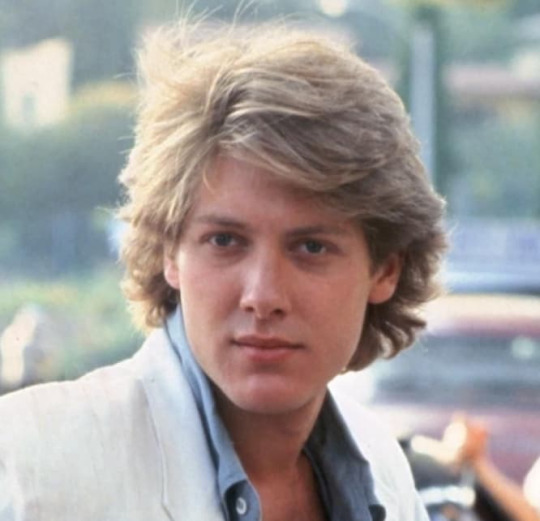
This rating is only for how tertiary his character is, because it's definitely a five-Spade performance. And it's undoubtedly Spader's best known mainstream role (aside from Stargate). Literally nothing about this performance isn't immensely entertaining. There's nothing not to love about how effortlessly Spader sleezes drunkenly through this film. So effortlessly, in fact, that he almost didn't get hired because he was so convincingly scummy that John Hughes mistook it for Spader's own personality and absolutely hated him on first meeting. And his line delivery on "Oh, you are worthless, aren't you?" Incomparable.
That said Pretty in Pink is perhaps the only movie on this list wherein James Spader isn't my primary impetus for watching it. Even the best movies on this list work, primarily, because of what Spader brings to the table, which isn't true for Pretty in Pink, because this movie hinges, let's be honest, on John Cryer.
The New Kids (1985)
♤♤♤♤
Is James Spader Naked?: *hysterical giggling* yeah.
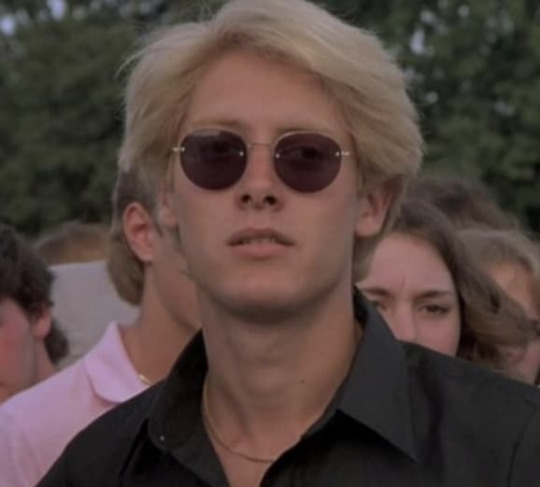
Two military kids move to Southern Florida to live with their uncle at his small local amusement park after the untimely death of their parents. At their new school they quickly find themselves clashing with creep, weirdo and all around snappy dresser Eddie Dutra (Spader) and his gang of hick delinquents.
Lawd what is this movie? No, seriously I don't even know what genre to call this. It's sort of a combination teen drama/thriller with the score of a giallo film plus some work out montages. I'm not really sure who this was made for, because it's definitely a teen thing, but it's rated R.
Ol Jimmy (fun fact he actually prefers to be called that irl) definitely has his Gay Villain pants (and shirts) on here, and very nicely fitted they are too. Dutra may be the most disgusting villain role I've seen Spader play, but by 'eck it's entertaining, and the bleach blond dye job is an interesting look on him to say the least. He also executes a slap and face grab that is just pure artistry.
Tuff Turf (1985)
♤♤♤♤♤

Well, after a fantastic three months of Spader films, we closed out with my personal favorite (Sex, Lies, and Videotape and Secretary notwithstanding), Tuff Turf.
Much in the same vein as the previous entry, this fits into the odd Young Adult genre, with its high school setting but with quite a lot of violence and nudity. It lacks the giallo edge of The New Kids, though, and this time, James Spader plays the protagonist, Morgan Hiller.
Morgan's family relocates from their native Connecticut to Los Angeles after his father loses his business. Morgan, whose malcontent has gotten him thrown out of several prep schools in New England, becomes fascinated by, and immediately begins to pursue Frankie (Kim Richards). The fact that she's dating Nick, a possessive, sociopathic ruffian, seems to make no never mind to him. Determined to show Frankie the kind of relationship she deserves, Morgan, like a terrier, refuses to give up his suit, regardless of the danger.
It's a batshit movie with warehouse bands, country club crashing, go-go dancers, Robert Downey Jr. before he got his teeth fixed, a very nice and tasteful love scene, and also an ax fight. It's about the most fun you can have in under two hours with a lot of very pretty, frequently shirtless James Spader. This is his first leading role ever, and his natural charisma needs no time to get flowing. It is glorious.
Fun fact Tuff Turf and The New Kids released exactly one week apart in January, 1985. Imagine the whiplash of going from Morgan Hiller to Eddie Dutra.
Is James Spader Naked? Yes. He's shirtless. And, actually, so is Robert Downey Jr.
#james spader#sex lies and videotape#tuff turf#the new kids 1985#pretty in pink#jacks back 1988#the rachel papers#bad influence 1990#white palace#true colors#dream lover 1993#stargate 1994#wolf 1994#crash 1996#supernova 2000#secretary 2002#alien hunter 2003#movie marathon
485 notes
·
View notes
Text
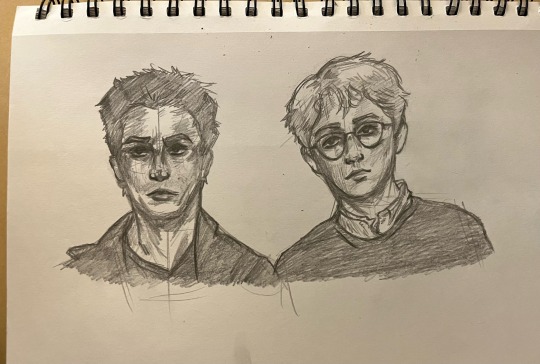
ummmm a bad influence (1990) doodle cause 🫣
10 notes
·
View notes
Text
finally (finally!) scanned this old beauty:
what if bad influence (1990) was even more homoerotic and also... vampires?
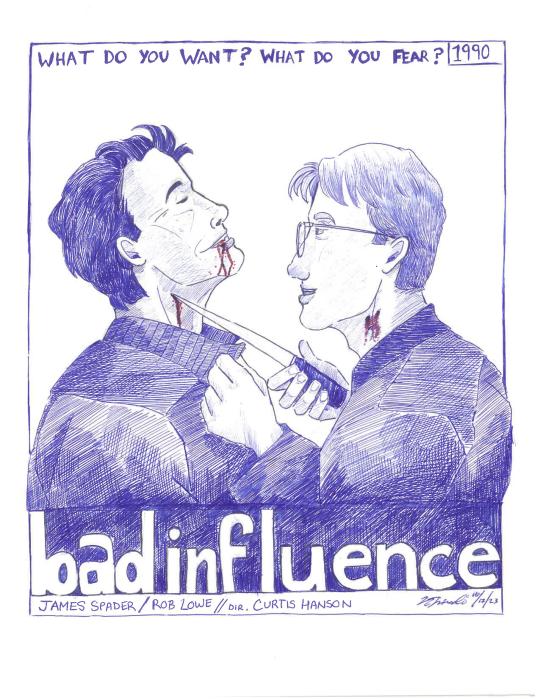
still so proud :) except I could have done better on spader's face
0 notes
Text

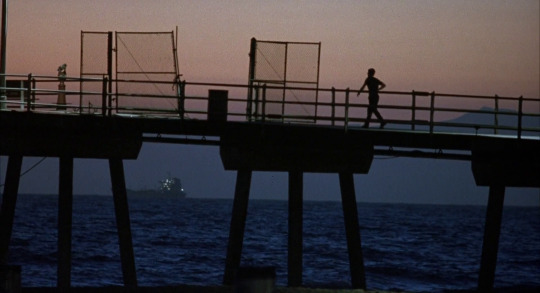
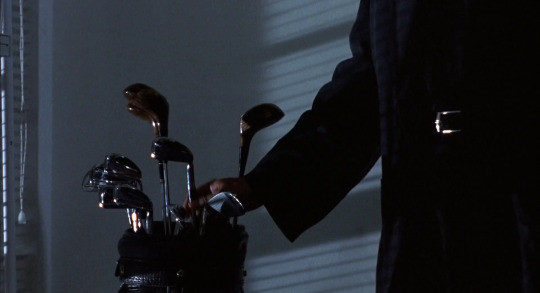


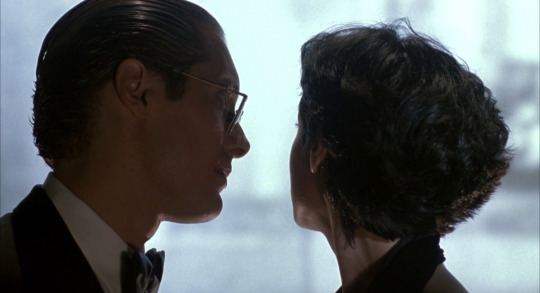

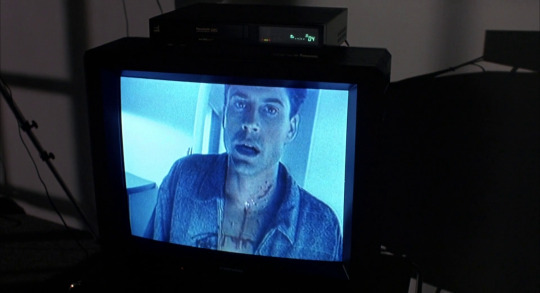

Bad Influence (1990)
Directed by Curtis Hanson
Cinematography by Robert Elswit
74 notes
·
View notes
Text
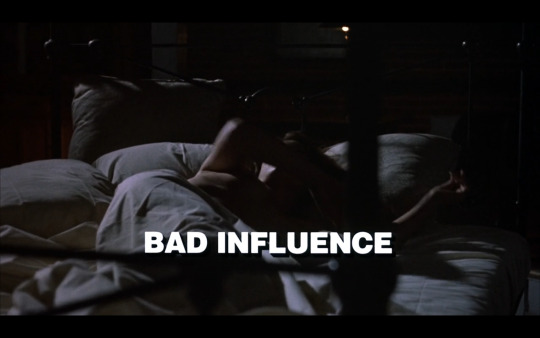
Bad Influence by Curtis Hanson, 1990
#curtis hanson#james spader#rob lowe#lisa zane#Marcia Cross#bad influence#thriller#drama#1990s movies#1990s fashion#1990s music#1990s
2 notes
·
View notes
Text
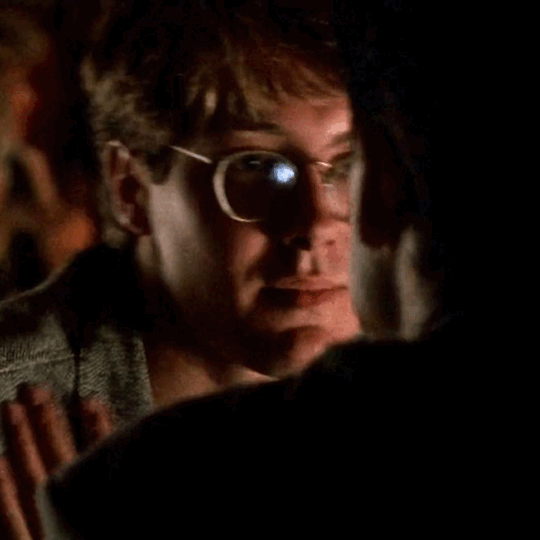
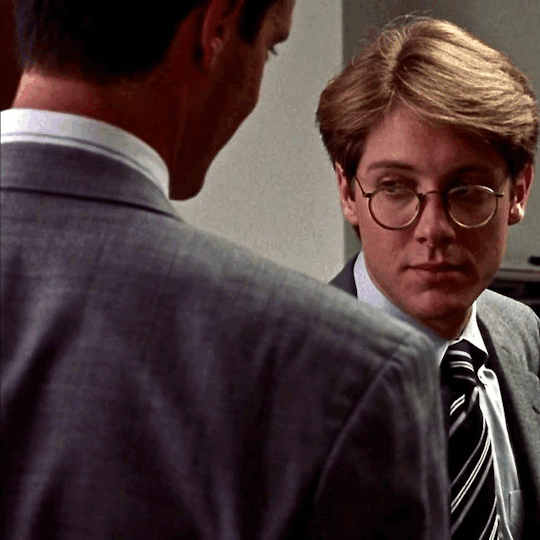
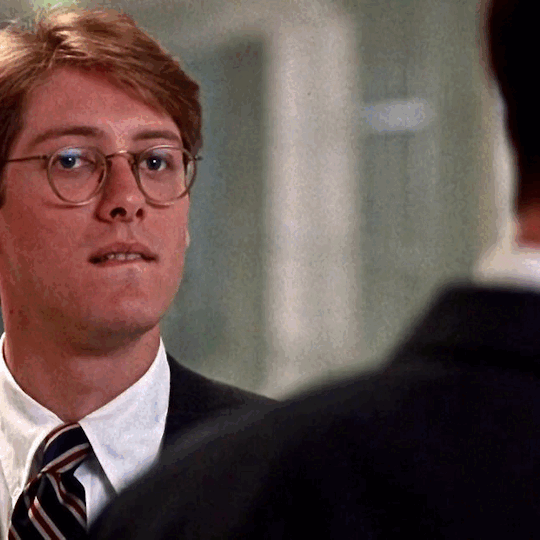
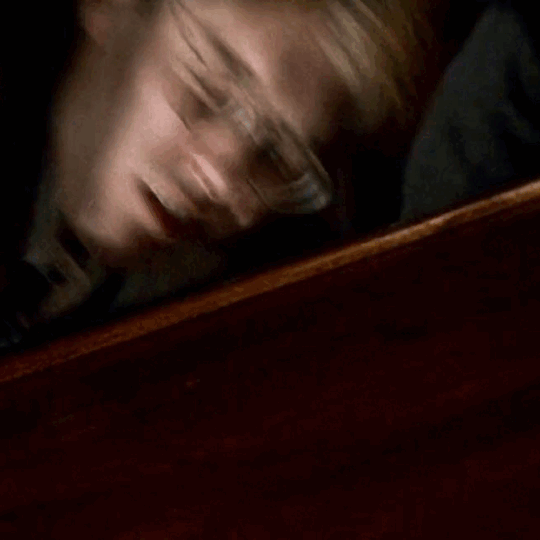
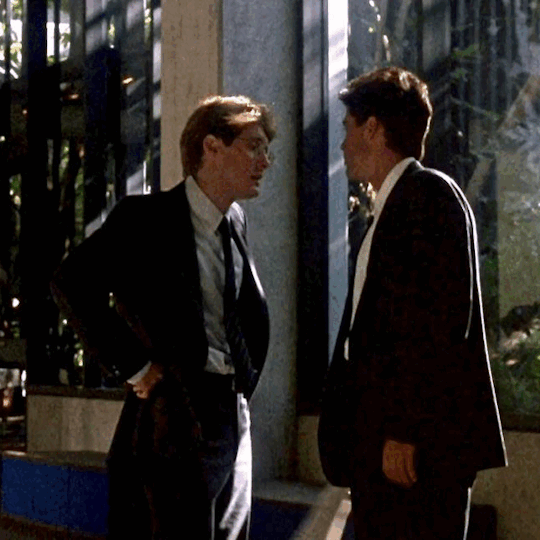
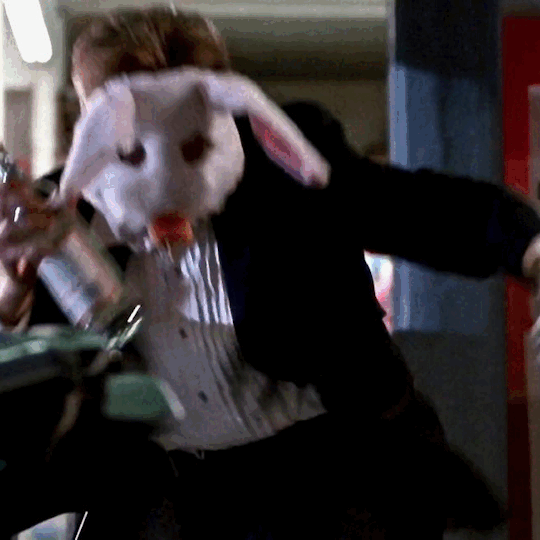



James Spader as Michael Boll in Bad Influence (1990)
942 notes
·
View notes
Text

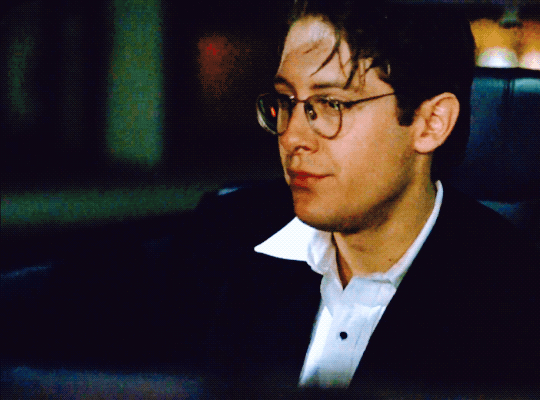
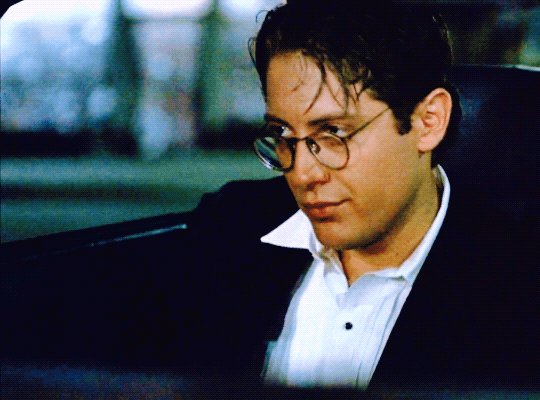
BAD INFLUENCE (1990)
#🐰#only jimmy can be this horrendously sickeningly trashed and make it look this sexy rather than pathetic#james spader#bad influence#*#movie titles are so funny. like yeah that guy was a bad influence huh
76 notes
·
View notes
Text
updated a little flashback Vladlence script thing that I started writing in like 2020. some of you may remember this comic
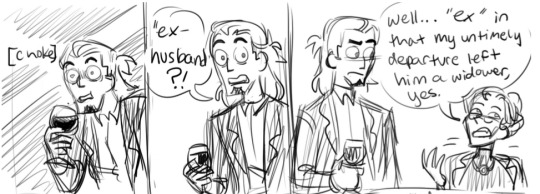
Smile :)
•••
[The year is 1990-something-- before Vlad betrayed and temporally displaced Silence that one time. Vlad and Silence (in human disguise) are at some kind of businesspeople shindig. They've stepped outside for some air and are basically alone. Vlad has a glass of wine.]
S: Lord. I'd forgotten how tedious these are.
V: They're really not worth it unless you can drink. It was so much worse when my parents would drag me to these as a child.
S: Hm. I didn't mind my father's business functions, but my ex-husband's were insufferable.
V: [chokes on wine] "Ex-husband?"
S: Well... "Ex" in that my untimely departure left him a widower, yes.
V: ...is he a--
S: [rolling eyes] NO, he is not a ghost.
V: Still! How have you not mentioned him once?
S: [shrugs] It didn't come up.
V: That isn't fair! I've spilled my guts to you for your research. You HAVE to tell me something!
S: You're being ridiculous.
V: ...That's it. I've decided.
S: Decided what?
V: The favor you owe me for bringing you along as my plus-one tonight!
S: Oh, please! All I've learned this evening is that you're still capable of being intoxicated by normal amounts of human alcohol.
S: Now, you've learned that I had a husband once, a very long time ago. I'd say we're already even.
V: [pouts]
S: Why does it even matter to you?
V: .........if I say, will you tell me more about your human life?
S: I--! Oh, fine. Whatever. Yes.
V: Because marriage is--! It's--! Marriage is everything! It changes your whole life! You finally have someone to always be there for you, in sickness and in health and all that.
V: How could you just...[mimes swatting something out of the air with his free hand] move on, after that? It makes no sense!
S: [tuts, rolls her eyes] You're insufferably romantic, you know that?
S: Marriage is not "everything." My marriage had everything to do with finances, and precious little to do with anything else.
V: ...Oh.
S: That's less common these days, I'll admit, but forgive me if I still feel you're overselling it.
V: ...Well...Still, he was there, right? At least you had someone.
S: [annoyed] Sure. Can we talk about something else now?
V: Did you have a family? [leans against the balcony, resting his chin on a hand, smiling expectantly]
S: [frowning] ...Not the change of subject I was hoping for.
V: [just keeps looking expectantly]
S: [sighs heavily] [trying to be annoying on purpose] Well, I had a mother and father, two siblings-- both of which died in infancy-- and on my mother's side, my cousins--
V: [impatiently] I meant with your husband!
S: [twitches] ...No. It was just he and I, and then I died.
V: Oh.
S: [snarky & bitter] ...Then, he remarried a nice young lady who got to keep all of our money. They, I believe, had several children together.
[Silence is quiet in a sort of uncomfortable angry way. Vlad, oblivious, gets lost in his own thoughts.]
both: .......
V: [CLEARLY thinking about Maddie. a bit dreamily] ...do you ever wish that you could do it all over?
[Vlad is looking at the sky, and doesnt see the judgemental, incredulous look Silence immediately shoots him]
V: That you had more time to make it work?
S: [humorless laugh] HAH! No!
V: [snapped out of his reminiscing, looks at her, surprised] No?
S: [like its an uninteresting, obvious fact] My life didn't have anything worth going back to.
V: [disgust directed at the percieved failure of the faceless husband figure] He was that bad?
S: [waves dismissively] No, no. Our marriage wasn't bad. It just wasn't--
S: ......well, it wasn't much of anything, I suppose.
V: [furrows eyebrows] Hm.
S: [after a short pause] I much prefer this.
V: [for some reason, his heart skips a beat] This?
S: [a bit frantically] My research! In the Ghost Realm. The achievement, the influence, you know. Much more fulfilling.
V: [nods, a bit spacey because of a weird inexplicable feeling he's having] Ah. I see.
172 notes
·
View notes
Text
My astrology observations Part 1 (Feb 2023)

⚘ Scorpio placements
They cling to their emotions for longer than it is needed. Even if they are consciously aware of their rumination, it is very difficult to shake off the extreme feelings. They tend to revisit the memories from past. Even when life is good, they remind themselves of the bad that happened in past.
Sense of injustice, unfairness of life, revenge tendency exist. My mom as venus in scorprio keeps ruminating everything that offended or triggered her.
Tend to be very aware of human psychology since childhood. Their spirituality is not "everyone is love and compassion" but it is through psychology that they spiritually grow.
⚘Aries placements:
Short tempered. Leaderly. Quite confident even if they are in the wrong. Their confident and self assuredness can be an obstacle when they refuse to take responsibility for their wrong.
On the upside, aries placement is go getter and life up the spirit with their confidence when otherwise the situation is pessimistic. Their heatedness and mars energy also makes them hardworking. They are far from lethargic.
⚘Gemini placements:
Teenager energy. Emotional maturity is that of a teenager. **It is my insight that Gemini people talk a lot because it helps them ease their anxiety. Since they are so detached from their core and feelings, their anxiety builds up as a result of ignoring their true emotions - this is released through communication and especially verbal output.
I would not be surprised if most of the comedians, talk show hosts, chatty people have one gemini placement. Gemini needs to talk like it needs to breathe.
They are actually quite flaky. They remind me of youtube shorts section - going from one thing to the other throughout the day. I would bet most influencers have to have an air placement to be putting themselves out there in a public display. They are the only ones who can brainstorm ideas and content creation. Especially the memes, comedy, skits section. For eg, I used to watch Ryan Higa a lot and he was born in 6 June 1990. I dont have his birth details though I can figure out he must have some gemini placement and his youtube channel in early days was proof of that.
Not that gemini cannot mature but they must have a water placement in D1 or D9 chart to outgrow their flakiness eventually.
⚘Libra placements:
They actually avoid conflicts. But if their other placement is fire sign then are go from short tempered to conflict avoidant back and forth. Conflicting placements in the chart create a mess. For eg, water and fire placements together cannot be stable with either. Similarly, water and air placements - they are either feeling to the extreme or jumping emotions like it is nothing.
Yes they are charming too. Something about them makes them very charmful. Also people pleasers and codependent. Insecurities are a hell of a thing. Who is not insecure in this world? It can take a lifetime to outgrow an insecurity but the person has to be willing to work on it.
⚘Moon sign and mother connection:
Moon sign and placement shows how the mother actually behaves with you. Two siblings in one house can have different perspective of their mom. I have gemini moon and I perceive my mom as a friend like, funny, jokey but it is in 8th house so the eggshells, volatility, shadow projection is also there. My brother has pisces moon so he views mom as emotional bag and thinks her energy is attractive but it is also in 8th house so he dealt with eggshells and projection too.
My cousin has moon in scorpio and his mom is the hallmark sociopath and it is in 8th house so as a grown up he is low contact with her. The most striking theme is that for the other external world their mom is a different person but only the child knows that mom is not consistent and stable.
These moms project their shadow on the child and think their child is all those insecurities they have in themselves. For eg, if they think they are stupid then they project it on their child too and think their child is stupid too.
⚘Saturn in 8th house:
Saturn and 8th house. Sigh. Double patty karma burger. Hard working, disciplined but seems to be a pattern that their hard work is washed by unpredictable detour. They work hard to go from block 1 to 4 but fate pushes them back to block 2. Very fated life.
Unless their chart has inner planets in 8th too they are very resistant to personality change. And unfortunately personality change is the lesson of 8th house. Psychological death and rebirth is the lesson of 8th house and saturn resists that. They have a fear of change even if they are consciously aware that something is wrong in their life. Personality change can reduce a lot of life problems but people resist that.
May have a "started from the bottom now we are here" story. Their grit and saturn's rewards can make them self made persons.
🌼🌼🌼🌼🌼🌼🌼🌼🌼🌼🌼🌼🌼🌼🌼🌼🌼🌼🌼
#astro community#ascendant#astro observations#astro notes#astro placements#astro tumblr#astroblr#astrology#astrology aspects#astrology blog#astrology notes#astrology observations#astronotes#astrology community
458 notes
·
View notes
Text
Man, Caretaker's a pretty functional pilot, but it does illustrate how awful of an idea the Kazon were from the jump. There's just an uncomfortable "They're not civilised enough" subtext running through all the scenes of Voyager's crew interacting with them, and even though the decision to blow up the array is pretty well-justified by the fact that... y'know, they're going to kill the Ocampa with it if it isn't blown up, it's hard to get past that impression.
(And that's before we even get to the series outline using "Bloods and Crips" as an analogy for their culture, which is, again, adding an uncomfortable racially charged element to their backstory that never really goes away.)
It's also just very clear that the show is immediately rooted in a very '90s view of America's role in foreign politics. "We never asked to be involved, but we are" is very much in tune with the America that believed in its duty as the lone remaining superpower to intervene in places like Somalia or the Balkans. When contrasted with the prescient realpolitik of DS9, it perhaps hasn't aged as gracefully in this day and age.
If I ever get around to doing that cultural history of Star Trek, Voyager will be... an interesting chapter. Anyway in the meantime go read Darren Mooney's pieces on the show, I'll confess that he has very much influenced a lot of my thinking on this here trek of stars.
(I don't hate Voyager btw, I think it's got some absolutely fantastic episodes. It was perhaps occasionally a little scattershot creatively, and it exhibited a toxic combination of "coming up with some bad ideas" and "being frightened by those initial bad ideas into a sort of complacency," but those flashes of brilliance are well worth praising. Also in the interests of balance, DS9 didn't handle the whole "Los Angeles gang culture fears of the 1990s" subject too much better in The Abandoned, and that was only about two months earlier, so swings and roundabouts I guess.)
123 notes
·
View notes
Text
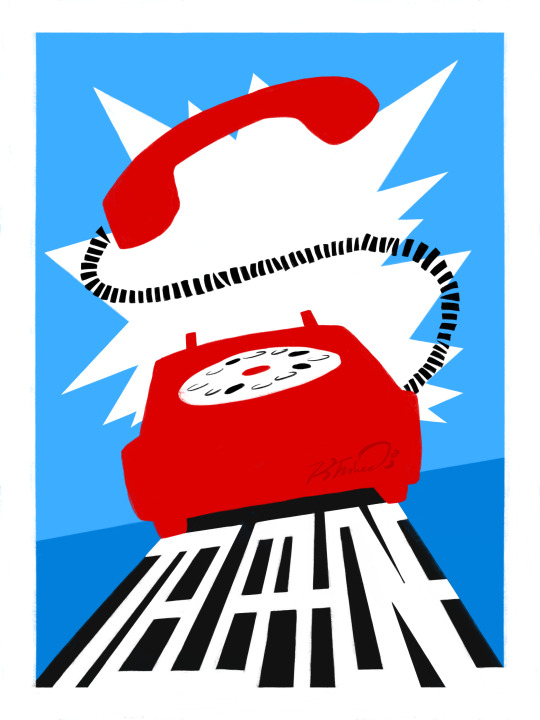
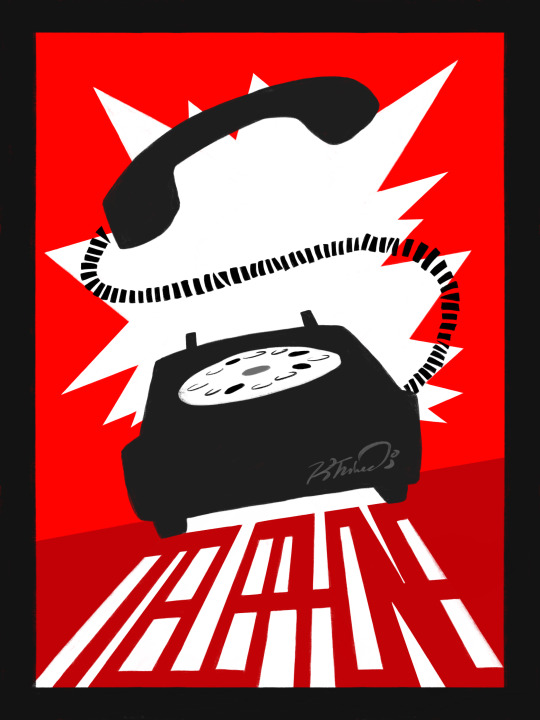
#fake movie posters!#done while watching bad influence (1990) one and a half times#it’s a good flick#neo-noir lighting and saxophones#starring james spader as naive yuppie with everything but satisfaction#and rob lowe as The Worst Guy on the Planet#television static motif <3#my art#snailman sketches
1 note
·
View note
Text
I want to argue that Dracula is the first work of Nokiawave.
-It's heavily concerned with new technology which drives the plot: Telegrams between everyone being collated into the text, Dr Seward's audiolog on the phonograph which Mina types up, mass transit in the form of both trains and Tube, steamships (and specifically the contrast between steam and sail) and loads of minor examples.
-It's concerned with new social technologies and social change: Mina is a typist, a respectable modern job for a young middle-class woman. Jon is a clerk and is working in an exciting emerging market. Dr Seward uses all the modern methods and keeps up with theory and scientific developments. Lucy is pleased to have plenty of male friends, not just to be seeking to marry. And it contrasts this with both the "good" Old Ways - The helpful, hopeless, peasants who give Jon his anti-vampire icon, the "broad minded" but also clearly steeped in superstition Van Helsing - and the "bad" Old Ways - Obviously, Dracula and also the enslaved Roma (Who, oh god, I I have to write about them in the context of Romanian chattel slavery of Roma, which was technically abolished in stages throughout the 2nd half of the 19th century, but where emancipation came with enforced sedentarism and obligation to a landowner - And where many remained enslaved in all practical terms into the C20th, and specifically in Transylvania the effects of Maria Theresia's Four Decrees that were still in effect that meant they would both be indentured to a landowner as "new farmers" and their children would be kidnapped by the state and given to white families for "reeducation" - but most people analysing the text seem to treat them as willingly Evil Minions).
-It's full of the anxieties about what Eastern and Southern Europe will do as they "modernise and open" (ie become financially and culturally available to the West) and specifically the fear of the Rich Slavic* Oligarch (to a certain kind of British mind, anyone east of Berlin and north of Athens is Slavic, sigh) spreading their malign influence in the Capital Cities of the West. Even the touch that Dracula was once a warlord but is now a slick investor and man-about-town.
-It has lots of continent hopping, focusing on the ~local colour~ in Transylvania and the contrast between both the "superstitious" locals and the traveller who finds it all very quaint and interesting but not very serious, and between the poverty of the normal people and the wealth and seclusion of Dracula, and then likewise giving us whistle-stop tours of the interesting bits of Whitby and London, making the city as much of a character as the humans. The Westerner abroad is seen as just a natural phenomenon, but the foreigners* in Britain are notable and exotic.
- It has a mysterious superweapon/monster which is hidden around a big western capital city, where most people (and even the police and regular military) have no idea what it is and are powerless to stop it, and a lot of tension lies on the crux of "What happens if this gets out here, surrounded by all these civilians?" - In a way that treats the mythological East* as a natural place for atrocities to occur, but them happening in London is a shock.
-It has spying: Jon sneaking around the locked-up Carfax with his miniature camera, trying to take pictures to find out what Dracula is doing in there, could have absolutely been in a 1990s thriller. Likewise, meeting in Harrods to avoid suspicion because it's a plausible place for a fashionable young lady to be, surrounded by anonymising crowds.
-It has information warfare: Dracula reading up on British politics, studying maps of London, paying clerks and using shell companies to disguise his property acquisitions, and likewise the heroes using the telegram and port records and the sheer mass of paperwork generated by his activities to track Dracula, which feels like close kin to the Nokiawave staples of finding someone on cctv or by their credit card, or their car registration being flagged at a checkpoint. Jonathan lamenting the lack of an Ordnance Survey in Europe and the unmapped bits of Transylvania specifically really fits with the idea of the "Control Grid" posited by Gregory Flaxman who writes a lot about surveillance and information control in cinema.
-It has a team of both specialists and laypeople who were dragged into the action by circumstance, and much relies on their relationships. The laypeople's "unimportant" skills (Jonathan's knowledge of property and finance especially, and Mina's skills with logistics as well as her innovation and bravery in using herself as a conduit to Dracula) turn out to save the day. The team is multi-national and basically represents The Free World (TM), as well as allowing for jokes about national stereotypes.
-Mina being notably not a damsel in distress, but instead using her personal connection to the villain to absolutely ruin him in ways that nobody else could, is very much like the role of many women in Nokiawave films: She may be traumatised and in danger, more than anyone else because of the villain's obsession with her, but she's smart and deadly and willing to take risks to complete the mission.
-It ends with a massive cross-continental vehicle chase with tonnes of explosions.
147 notes
·
View notes
Text
The Riddle of Tom Riddle: Part 1/?
(Part 2, Part 3, Part 4, Part 5, Part 6, Part 7)
The Death Tool of Voldemort's Wars
So, I did say I'll make this post somewhere, so here it is.
When trying to make sense of Voldemort’s behavior in the books, I noticed that the two wars were actually very different. How they were waged, how many people died, and who was most targeted along with Voldemort's goals.
(Because I mentioned it, I'll just say Voldemort’s behavior in the book is really weird and somewhat contradictory, but I found a way to explain that. Consider this the second post on my way to analyze Voldemort after the Horcruxes one)
The Wizarding Population in the UK
The first step to figuring out how bad the wars with Voldemort actually were is to know the size of the wizarding population in the UK. Numbers of deceased don't mean much without being able to calculate percentages.
If there are 40 students a year at Hogwarts in 1990s → 400 wizards and witches between ages 10-19
Account for fewer births during and right after the war with Grindelwald in the 1930s-1940s, and the war with Voldemort in the 1970s
Account for longer life acceptancy (Average of 130)
And we get an estimate of something like this:

With wizards being around 0.01% of the muggle population in any country.
The population in Britian in 1991 was 57,359,454, making the wizarding population 57,359*0.01% =~ 5,700
The population in Ireland in 1991 was 5.1 M, making the Irish wizarding population about 510.
So as a rough estimate, we'll say there were ~6,200 wizards and witches in the UK and Ireland together in 1991
Probably less though considering JKR killed most of Harry's grandparents' generation with Dragon Pox....
By the same logic above in the 1970s the Wizarding population in Britain and Ireland was ~5,600 + ~300 = ~5,900 wizards and witches.
So, now we have the estimated size of the population and we can gage how much damage these wars actually caused.
So, I may have compiled a list of all war casualties from both wars. I will not place the full details here (like the exact year each died), but I'll mention sides, who they were killed by, and any other information relevant to understanding the war's influence on wizarding society, and what we can learn from it about Voldemort's intentions.
For these lists:
(M) - muggle
(MB) - muggleborn
(PB) - pure-blood
(HB) - half-blood
(O) - other
$ - Death Eater or affiliated
^ - Order of the Pheonix member or affiliated
Italics - killed against Voldemort's orders
The First War: Surprisingly Targeted
Killed By Voldemort Personally:
~4 unnamed goblins (O)
Dorcas Meadowes (PB/HB)^
James Potter (PB)^
Lily Potter (MB)^
Killed by Death Eaters:
Mr. Bones (PB)^
Mrs. Bones (PB)^
Robert McGonagall (PB)
Marlene McKinnon (PB)^
~4 more unnamed McKinnons (PB)^
Mrs McGregor (M)
Douglas McGregor (M)
2 McGregor Children (M)
Caradoc Dearborn (PB/HB)^
Dean Thomas’ Father (PB)
Edgar Bones' Wife (PB)^
Edgar Bones (PB)^
~2 Edgar Bones' children (PB)^
Benji Fenwick (PB/HB)^
Frank Longbottom (PB)^ - Not dead, but counts
Alice Longbottom (PB)^ - Not dead, but counts
Fabian Prewett (PB)^
Gideon Prewett (PB)^
Killed by the Order of the Pheonix & Aurors:
Evan Rosier (PB)$
Wilkes (PB)$
+ 13 muggles killed by Peter Pettigrew on October 31st, 1981
+ Regulus Black who died in the cave with the Inferi
This lands us at 45 casualties (including the Longbottoms) for the first Wizarding War. Now, let's look more closely at the numbers.
Not counting the muggles and creatures other than wizards lands us at 24
24/5,900 =~ 0.40% of the wizarding population was killed in the first war.
And did you notice anything interesting about the names on the list? There is only 1 muggleborn and 1 muggle family, whose death wasn't even on Voldemort's orders. What does it tell us about the war?
Well, first off, Dumbledore's idea of morality and not using dark magic and lethal curses kind of sucks. This is hardly a war, it's a massacre. 19 Order members and their families die compared to 3 Death Eaters, one of which was killed by Voldemort's creations. Moody and Mr. Weasley aren't kidding when they say the first war was rough in the fifth book. It really was, but only for their side.
The innocent casualties of people not belonging to any side in this war stand at 19 (including the 13 muggles killed by Pettigrew), and 6 (not including Pettigrew).
It's just wild how Peter Pettigrew has the most kills in this war, more than Voldemort. And it tells you a lot about Voldemort's priorities.
His priorities clearly aren't to kill all muggleborns, we can see that much. So what are his priorities? What is he actually waging a war for if it's not to kill all muggleborns like all the characters tell us?
Well, I will post a full rundown of the timeline of the first war at some point, but for now, what we know is that Voldemort is targeting the Order of the Phoenix, who opposed him. And he is in general causing chaos for the Ministry of Magic.
We know that by 1981, Voldemort practically won, with the ministry having more spies of his than any other group. The ministry was made up of Death Eaters. But we don't know of any rules he passed in this time, or moves to legalize dark magic or outlaw muggleborns — nothing like that happened.
What did happen, was that Voldemort made a cave filled with Inferi and experimented with potions (he invented the potion of despair in the cave).
It seems, more than anything, the war was there to distract the ministry or weaken it, and less about accomplishing a specific political goal. And if he was after a specific political goal, then it isn't blood purity as he isn't rounding up muggleborns like in the second war.
The low death count overall (especially when compared to the second war) is because Voldemort is there. Voldemort does not approve of unnecessary death, even muggle one:
“Nice costume, mister!” He saw the small boy’s smile falter as he ran near enough to see beneath the hood of the cloak, saw the fear cloud his painted face. Then the child turned and ran away. . . . Beneath the robe he fingered the hand of his wand. . . One simple movement and the child would never reach his mother. . . but unnecessary, quite unnecessary. . . .
(Deathly Hollows, page 295)
Voldemort himself does not like unnecessary death. He considers it and killing in rage below him at the end of the First Wizarding War. He doesn't do it himself and doesn't let his followers kill unnecessarily up until the night he kills the Potters.
What exactly Voldemort was trying to accomplish is a question I've pondered and have a few more posts about. But understanding he wasn't really after the death of all muggleborns and neither was he after control of Magical Britain, which is made very clear by the second war, is the first step to understanding him.
The Second War: Chaos Galore
Killed By Voldemort Personally:
Bertha Jorkins (PB)
Cedric Diggory (PB)
Bathilda Bagshot (PB)
Charity Burbage (PB/HB)
Alastor Moody (PB)^
Rufus Scrimgeour (PB)
German-speaking child #1 (M)
German-speaking child #2 (M)
German-speaking woman (M)
Mykew Gregorovitch (PN)
Gellert Grindelwald (HB)
Peter Pettigrew (PB/HB)$
2 Unidentified Death Eaters (PB/HB)$
Severus Snape (HB)$
Killed by Death Eaters:
Bodrick Bode (PB/HB)
Emmeline Vance (PB)^
Sirius Black (PB)^
Amalia Bones (PB)
Florean Fortesque (PB)
Mrs. Abbott (PB/HB)
Igor Karkaroff (PB)$
Montgomery (PB/HB)
4 Unidentified Muggles (M)
Gibbon (PB)$
Albus Dumbledore (HB)^
5 Unnamed muggles in Gaddley (M)
Gornuk (O)
Edward Tonks (MB)^
Dirk Cresswell (MB)
Dobby (O)
Lavender Brown (PB)^
Camelia (PB/HB)^
Vincent Crabbe (PN)$
Colin Creevey (MB)^
Remus Lupin (HB)^
Nymphadora Tonks (HB)^
Fred Weasley (PB)^
Killed by the Order of the Pheonix:
Bellatrix Lestrange (PB)$
Killed by Golden Trio:
Bogrod (O)
Tom Riddle (Voldemort) (HB)$
+ 42 more casualties for the Battle of Hogwarts.
What we see here is that this second war was much deadlier. The Battle of Hogwarts alone had more casualties than the entirety of the First War. Even if I'm generous and add 20 more dead to my estimate of the First War, it doesn't come anywhere close to the death tool of the Second War.
Now, I ask myself, why?
The Second War was much shorter, officially ongoing between May of 1996 and May of 1998 (2 years), with the First War officially waging from 1975 to October of 1981 (6 years). What was so different between the wars that caused this kind of escalation in the second one this quickly?
We see the Second War unfold, we watch how quickly the Ministry of Magic falls and the Death Eaters take over. They quickly make laws such as the Muggleborn Registry — things that didn't happen in the first war.
“Attendance is now compulsory for every young witch and wizard,” he replied. “That was announced yesterday. It’s a change, because it was never obligatory before. Of course, nearly every witch and wizard in Britain has been educated at Hogwarts, but their parents had the right to teach them at home
or send them abroad if they preferred..."
(Deathly Hollows, page 182)
Lupin is talking about the Muggleborn Registry and compulsory attendance to Hogwarts — completely new things, never seen before in Britain. They weren't around the first go-around even if Voldemort had the same amount of control over the ministry (it being made up of his followers even in the 1970s). So, what changed? What's the difference?
I pondered this question, and I realized what the main difference is — Voldemort. He is different. His priorities are different.
In the second war, Voldemort doesn't show any care for the ministry, government, or unnecessary death the way he did in the First War. In the First War he limited his Death Eaters, focusing them on targeting only Order members, but in the Second War, not only did he let them loose, but he let himself loose as well.
And I'll prove just how unconcerned he is with Britain and the war during Deathly Hollows and Half-Blood Prince.
In Half-Blood Prince, when the Death Eaters break into Hogwarts to kill Dumbledore, arguably their biggest achievement in the war thus far, and where is their leader? Off, somewhere. Researching wands so he could kill Harry Potter.
And where is Lord Voldemort, leader of the Death Eaters when his followers take over the ministry and start passing the aforementioned rules? He's in Germany, tracking down the Elder Wand.
“That’s—that’s pretty, Dolores,” she said, pointing at the pendant gleaming in the ruffled folds of Umbridge’s blouse.
“What?” snapped Umbridge, glancing down. “Oh yes—an old family heirloom,” she said, patting the locket lying on her large bosom. “The S stands for Selwyn. . . . I am related to the Selwyns. . . . Indeed, there are few pure blood families to whom I am not related. . . . A pity,”
(Deathly Hollows, page 225)
Voldemort is so unaware and un-present in Britain during the time he supposedly rules it, that Dolores Umbridge can strut around the ministry with the locket that is his Horcrux and holds a piece of his soul and is his Slytherin family heirloom and claim it to belong to the Selwyn family and to be hers. And she wasn't tortured horribly to death.
Yeah, Voldemort never stepped foot in the Ministry throughout Deathly Hollows. At least, not until he retrieved the elder Wand and was convinced he could kill Harry.
In the First War, Voldemort had intentions, unrelated to blood purity as they were, but intentions nonetheless. He was actually leading and had goals for the war. In the Second War, it looks like he gave up. Like he decided killing Harry Potter is the only important thing and he isn't even bothering with anything else and lets his Death Eaters do as they please.
Conclusions:
Voldemort didn't really plan to win the Second War, he didn't really care what happened to the Ministry, as long as he could kill Harry Potter whom he is quite obsessed with. Like, he's really weird about Harry Potter, and maybe I'll talk about it more in-depth, but he's obsessed with being the one to kill Harry with a wand of his own, to the point of ignoring literally everything else.
If you are going to fight an opponent that is trying to kill you, you should probably be just as willing to be lethal in turn or you'd end up massacred like the Order of the Phoenix from the 1970s....
#hp theory#hp thoughts#hp#harry potter theory#harry potter thoughts#harry potter#lord voldemort#tom marvolo riddle#hollowedtheory#overthinking#voldemort#voldemort analysis#wizarding world#first wizarding war#second wizarding war#the order of the phoenix#order of the phoenix#death eaters
50 notes
·
View notes
